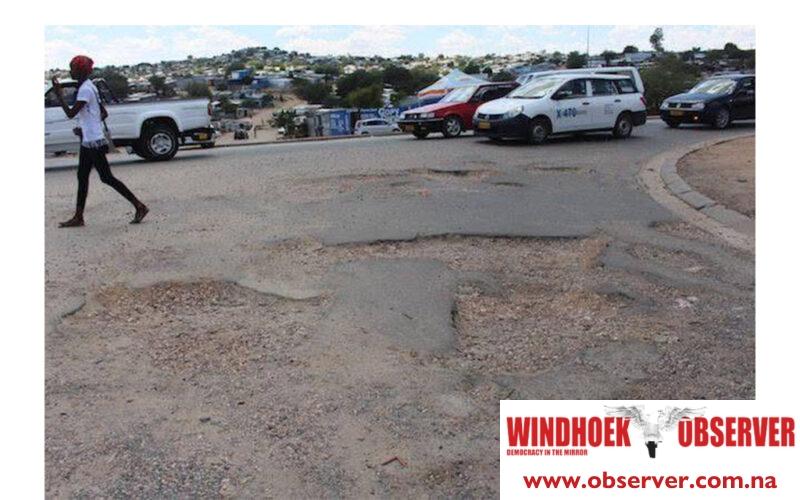Allexer Namundjebo
The City of Windhoek is under fire for poor road repairs, with residents and activists saying the work is already falling apart just months after rains damaged streets across the capital.
Katutura Residents Committee spokesperson Shaun Gariseb questioned whether the City is following proper standards.
He believes the current approach does not meet those requirements.
Gariseb said some roads are wearing off even without rain and warned that the City is wasting money on temporary fixes instead of doing proper repairs.
He added that the poor work affects residents financially, especially those with low-profile cars.
He said his tires and rims were damaged, forcing him to pay for repairs.
“More worrying is the nature of the materials being used. In many cases, what appears to be a repair is merely a layer of hardened stones and sand, which creates confusion for drivers. In some spots, it looks like a pothole but is drivable, while in others, it appears to be fixed but contains a dip that can be equally hazardous,” Gariseb told the Windhoek Observer.
He also criticised the City for stopping community efforts. He said the youth fixing potholes in Eveline Street did a better job than the City, but were told to stop.
“I am hoping that public funds will not be misused again to repeat past instances where millions of dollars went unaccounted for in poorly executed infrastructure projects,” he said.
The roadways Ordinance 17 of 1972 governs road construction in the country, outlining the procedures for establishing, maintaining, and managing roadways, including agricultural and district roads.
The Roads Bill is a new legislative instrument that is currently being developed.
Once passed, it would strengthen the current framework by regulating road ownership, building, and overall infrastructure management.
Activist Sam David said the rains have exposed poor planning.
“While the rains have replenished water supplies and supported agriculture, they have also revealed severe shortcomings in Windhoek’s infrastructure planning,” he said.
He slammed contractors working in Katutura, saying their methods are not only weak but are repeated often.
David said potholes are filled with sand and covered with bitumen, which washes away when it rains again.
“Once the rains return, the bitumen washes away and the sand is exposed, returning roads to their damaged state,” he said.
He questioned the assignment of better-performing contractors to suburbs like Klein Windhoek, but not to areas like Katutura, where road issues are equally urgent.
He said this shows an unfair delivery of services.
David also pointed out that some roads that only need maintenance are being completely rebuilt, while informal areas still lack basic road infrastructure.
He cited streets in Greenwell Matongo and Eveline Street in Katutura.
“This approach represents a misallocation of scarce resources,” he said.
He urged the City to focus on long-term roadwork and to direct resources to underserved areas.
Another activist, Frans Mandjoro, said the City keeps making the same mistakes. He said patching potholes is not enough if the fixes don’t last.
He said some potholes reopened within two months, raising doubts about how effective and costly the work is.
Mandjoro said most roads don’t need to be rebuilt. Instead, he said existing roads should be upgraded to handle the weather without breaking down.
“This approach would prevent the current state of decay that many roads in Katutura and other parts of Windhoek are now experiencing,” he said.
Earlier this year, the City admitted that rain had damaged many roads.
In a March statement, it said budget limits and staff shortages were affecting road maintenance, but said a long-term plan is in place.
The City plans to spend N$15.2 million on road repairs caused by the rains.
The money will go toward patching potholes and fixing road edges.
Last week, City spokesperson Lydia Akwenye said two companies are under contract to fix potholes.
Speaking to One Africa, she said each contractor has six teams working in the city’s eastern and western areas.
“We are also busy working out the appointment of a conventional road maintenance contractor that will start the work for a period of two years. This was just for an emergency response,” she said.




